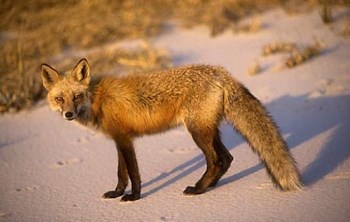
NPS Photo Unnatural overabundance does occur on Cape Cod in the case of what are known as "subsidized" predators". These are predators/scavengers with broad diets that take advantage of foods from human sources, such as food wastes, handouts, and road kills. These additional foods allow subsidized predators to reach populations beyond the natural capacity of the landscape, and exert unnaturally high levels of predation pressure on many other species of the park's wildlife. Thus wildlife species such as eastern box turtle, northern diamond-backed terrapin, piping plover, and least tern, already declining in the region due to habitat loss and other direct impacts from humans, may also be subjected to excessive levels of predation, which further threatens their survival. For these reasons, among many others, feeding wildlife in Cape Cod National Seashore is not allowed. Among the seashore's mammals, coyote, red fox, raccoon, skunk, and opossum are examples of subsidized predators that are impacting declining species. |
Last updated: September 26, 2018
